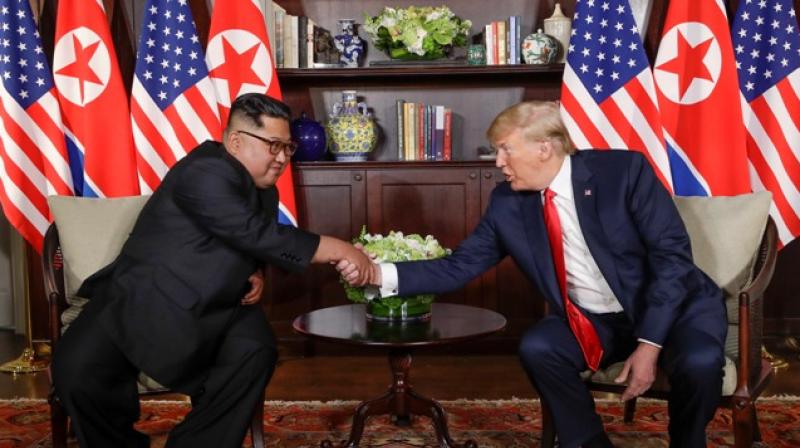Trump-Kim Jong Un meeting start of radical switchover', says North Korean media
The KCNA news agency reported that Kim Jong Un had invited US President Donald Trump to visit North Korea.

Seoul: Kim Jong Un invited Donald Trump to visit North Korea during their historic summit and the US President accepted, Pyongyang state media reported on Wednesday, calling it the start of a "radical switchover" in the nuclear-armed Cold War foes' fraught relations.
The unprecedented encounter in Singapore on Tuesday saw the leader of the world's most powerful democracy shake hands with the third generation scion of a dynastic dictatorship, standing as equals in front of their nations' flags. Kim agreed to the "complete denuclearisation of the Korean Peninsula", a stock phrase favoured by Pyongyang that stopped short of long-standing US demands for North Korea to give up its atomic arsenal in a "verifiable" and "irreversible" way.
In its first report on the landmark summit, the official Korean Central News Agency (KCNA) news agency ran a glowing dispatch on the talks, describing them as an "epoch-making meeting" that would help foster "a radical switchover in the most hostile (North Korea)-US relations". The report said the two men each asked the other to visit their country. "The two top leaders gladly accepted each other's invitation," KCNA said.
Pyongyang has reason to feel confident after the meeting which was a major coup for an isolated and heavily sanctioned regime that has long craved international legitimacy.
In a blockbusting press conference after the summit, Trump said the US would halt military exercises with Seoul -- something long sought by Pyongyang, which claims the drills are a rehearsal for invasion. The US stations around 30,000 troops in security ally South Korea to protect it from its neighbour, which invaded in 1950 in an attempt to reunify the peninsula by force.
"We will be stopping the war games which will save us a tremendous amount of money," Trump told reporters, adding that "at some point" he wanted to withdraw US troops from the South.
Both Seoul and the US military commanders in the South indicated they had no idea the announcement was coming, and analysts expressed immediate concern. Ending the drills "is in excess of all expert consensus, South Korean requests, and even a close reading of North Korean demands", said Adam Mount of the Federation of American Scientists.
The KCNA report said Trump committed to ending the drills during his meeting with Kim. It added that denuclearisation on the Korean peninsula would be dependent on the two sides "refraining from antagonising... each other out of mutual understanding".
The Singapore summit was a potentially legacy-defining meeting for both men -- comparable to President Richard Nixon's 1972 visit to China, or Ronald Reagan's 1986 summit with Mikhail Gorbachev in Reykjavik.
World powers from China to Japan, the European Union and Russia welcomed its outcome -- while cautioning it was only the first step towards resolving the nuclear stand-off with Pyongyang. Many agreements have been made in the past with North Korea that have later fallen apart, and ahead of the meeting, critics expressed concerns that it risked being more about headlines than substantive progress. It also legitimised Kim, critics charged, feting a regime which stands accused of widespread human rights abuses.
In the event, the two leaders showered each other with compliments in the sumptuous setting of a luxury Singapore hotel, a marked contrast from their previous rounds of mutual insults, such as "mentally deranged" and "little rocket man". Trump said he had formed a "special bond" with Kim, whom he described as "very talented".
KCNA said the two leaders ate and walked together, "deepening friendly feelings" towards each other.

